January is Alzheimer’s Awareness Month!
Community Changes Everything- Dementia Supports for Everyone
Thank You for Your Holiday Donation!
DFC Programming: Inclusive & Fun Experiences
Getting Support Before & During a Diagnosis
Which Dementias Are Most Common?
The Latest in Dementia Treatment Research – Lecanemab
2023 Winter Education Calendar is Now Available!
Upcoming Winter Community Programs
Dementia Care Series – Register Today!
Join a Support Group!
Donate Today to Help Our Work Continue
January is Alzheimer’s Awareness Month!

Community. Support. Knowledge. Expertise.
It’s Alzheimer’s Awareness Month! This month we’re creating awareness about our First Link® program, which is your connection to community, support, knowledge and expertise during your dementia journey – from early symptoms to diagnosis and throughout the progression of the disease. You are not alone. The Alzheimer Society is here to help.
Hear Their Stories
We’d like to introduce you to three Manitobans who reached out to the Society for support and information to help them navigate their unique dementia journeys. These three different perspectives, from two care partners and someone living with dementia, shine a light on the help and support available through our services and programs.
Click here to hear how Marcel found reassurance through his support group members after his wife’s diagnosis.
Click here to understand why community is an integral support for Jabbar.
Cick here to find out why Katherine never misses a support group meeting.
Click here to learn more about this year’s campaign and the many ways the Society can help if you are impacted by dementia.
Community Changes Everything – Dementia Supports for Everyone

Whether you live with dementia or care for someone living with dementia, the stigma and support challenges you face day to day can be overwhelming. For people who are part of the 2SLGBTQ+ community, a dementia journey can bring additional challenges.
Sharon Hunter is part of this community and has been navigating these complexities since her partner’s diagnosis of young onset dementia back in 2020.
Sharon describes her experience with dementia as running a marathon she didn’t sign up for. “It felt as if I’m struggling to run, but then suddenly, I have to jump hurdles of homophobia and internal biases throughout the race.” She says these hurdles, or barriers, made caring for her partner overwhelming and isolating.
“You never know how you’re going to be received when you step into a new space or meet a new person,” Sharon says. “Throughout an eight-month period of our dementia journey, I met with over 80 healthcare professionals and had to come out repeatedly, which was tiring. I was looking for support as a care partner, and it became more about us being a lesbian couple instead of focusing on our dementia needs.”
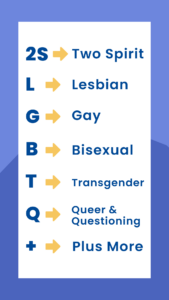
Sharon reached out to the Alzheimer Society for information and support for her and her partner as they were in the process of getting a diagnosis. She learned about the Support Group for Care Partners of Persons with Younger Onset Dementia from the Society staff and began attending.
“I was concerned whether the group was going to be a safe space for me to attend as a lesbian,” Sharon says. “I spoke to the facilitator at the Alzheimer Society about my concerns, and she was so caring and responsive. The Society has now introduced an inclusive welcome statement at the beginning of each meeting for the 2SLGBTQ+ and other marginalized communities. After hearing this welcome, I knew I was in a safe space.”
Although finding support through the Alzheimer Society has been a positive experience for Sharon, she and her partner face numerous barriers as a lesbian couple when navigating healthcare and government systems.
“I constantly have to clarify to care providers that my partner and I are in a relationship. And when I do that, I never know how the information will be received or if the care we receive will be compromised because of homophobia,” Sharon says.
The 2SLGBTQ+ community is dynamic and always changing. Sharon says the biggest thing organizations can do is to continue learning about the issues they face, listen and adjust their services to better fit the needs of the community.
“Fear of discrimination leads many 2SLGBTQ+ older adults from coming out on their healthcare journey. While it may be important to self-identify, it’s more than just checking a box,” says Ashley Smith, Older Adult Program Coordinator at Rainbow Resource Centre. “Negative experiences often prevent 2SLGBTQ+ older adults from asking the right questions in the doctor’s office, seeking fulsome support from health service providers, and accessing proper channels of care.”
“By acting intentionally, organizations can create inclusive services, practices, and policies to ensure all people receive the level of care and support they are entitled to.”

The Alzheimer Society and Rainbow Resource Centre formed a connection to exchange knowledge and resources to help better understand and support the 2SLGBTQ+ dementia community in Manitoba.
“My partner and I have both experienced homophobia, and it’s important for organizations and community members to understand the additional layers of what that means for our dementia journey,” Sharon says. “Having organizations with inclusive services is important because, as a care partner, I don’t always have the energy to educate and advocate for ourselves.”
Sharon says that both the staff at the Alzheimer Society and the other members in her support group have been an integral support to her.
“The other members of my support group became my allies, and they are the unsung heroes in my dementia experience,” says Sharon. “Everyone at the Alzheimer Society met me with compassion, and I’ve had an overwhelmingly positive experience. I encourage all Manitobans affected by dementia to reach out to the Society for support too.”
Community changes everything. Sharon says getting the support you need and surrounding yourself with people you can rely on is necessary for the well-being of both a care partner and the person living with dementia.
“You need people who can be there for you and your partner,” Sharon says. “I built two villages – one for me and one for my partner – of family, friends, neighbours and organizations to help support us and meet our different needs. The people in my village have helped carry me through this dementia storm.”
The Alzheimer Society will continue to provide a safe and inclusive space for all Manitobans impacted by dementia and to recognize each person’s individual history and experience in their dementia journey.
To learn more about Rainbow Resource Centre’s 2SLGBTQ+ Older Adult supports, check out their Over the Rainbow Program here or email Ashley Smith at [email protected].
Thank You for Your Holiday Donation!
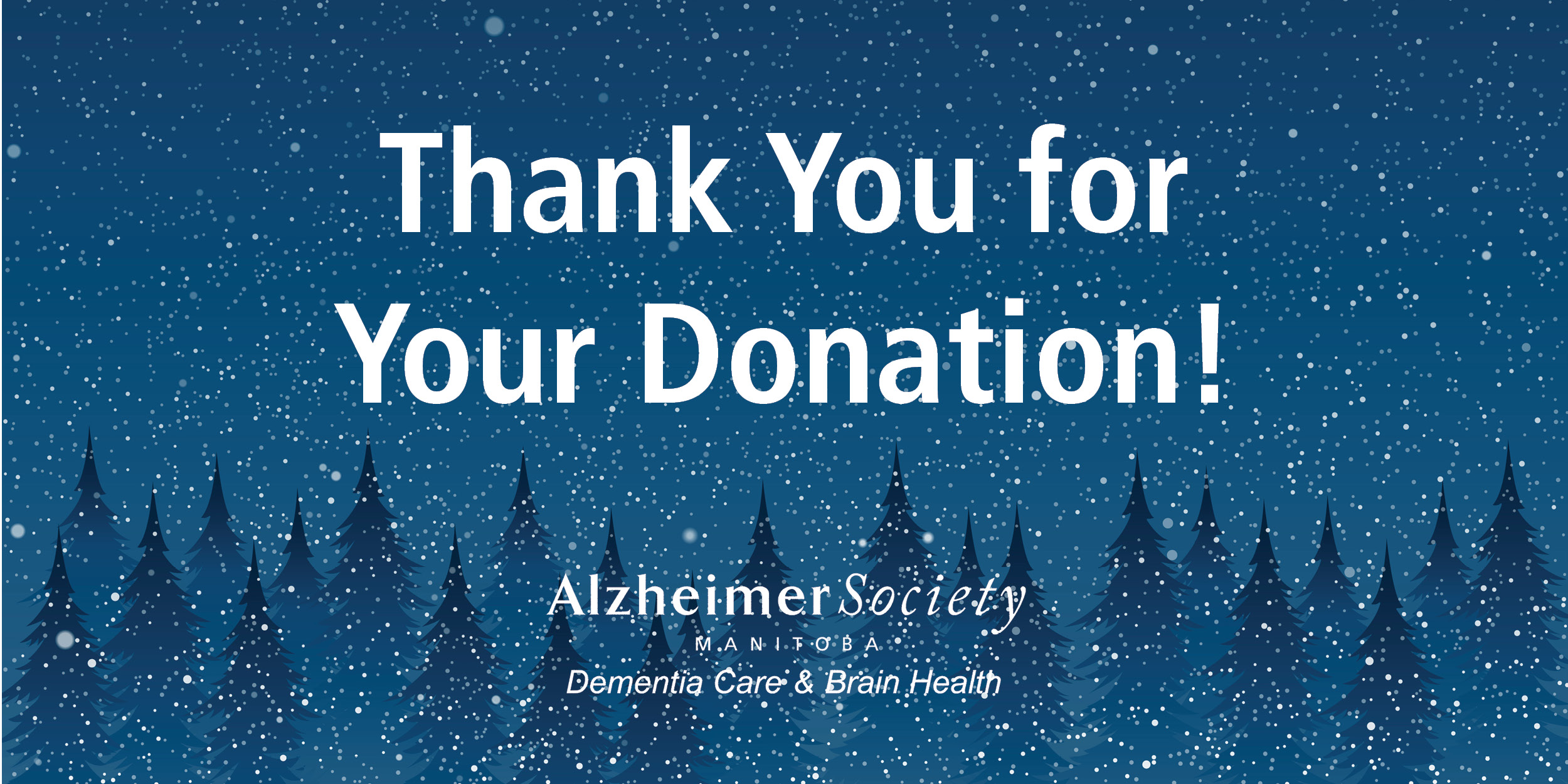
Thanks to all of our supporters for their generous donations to our December Campaign! Upon publication of this eNewsletter, the amount raised to date is $125,304.
That total includes $80,302 from 731 donors, along with $45,000 given by Neil Carlson, David Greenwood, Elden Wittmier and an anonymous donor. All were motivated to provide their matching gift because they understand, through personal experience, the importance of the Society’s services. Hats off to these individuals for stepping up to match your donations!
We are grateful for everyone’s support and commitment to the many Manitobans impacted by dementia and to the work we do to support them. We could not do this work without you.
Dementia-Friendly Community Programming: Inclusive & Fun Experiences
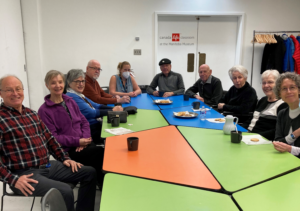
Dementia-friendly community programs offer people living with dementia and their care partners opportunities to participate in fun social, creative and educational activities in an accessible and supportive environment. The Alzheimer Society partners with various organizations like FortWhyte Alive, the Manitoba Museum and the Winnipeg Art Gallery to provide engaging programs year-round.
For Lorette Beaudry Ferland and her husband, Gilles, joining these dementia-friendly programs has helped them stay social and active and make new friends. The couple learned about them when Lorette reached out to the Alzheimer Society after Gilles received a dementia diagnosis in Fall 2019.
“We’re grateful the Alzheimer Society connected us to these community resources – the programs have made all the difference to us,” says Lorette. “They help normalize our life. Socializing can be challenging when you live with dementia, but these programs make it easy to get active and out in the community.”
This Fall, Lorette and Gilles attended Now and Then: A Journey Through Time at the Manitoba Museum. Lorette says the presenters and coordinators create an engaging and inclusive environment for all attendees, making the experience very enjoyable.
“The programs are geared for both my husband and me,” says Lorette. “I get just as much enjoyment out of them as he does! We look forward to getting out and doing something together.”
Lorette and Gilles also recently began attending Minds in Motion, a class for fun, fitness and friendship that provides opportunities for pairs to participate in gentle exercises, socialize, and play thought-provoking games with social and physical components.
“Every couple we met through the other programs encouraged us to join Minds in Motion,” Lorette says. “Now we encourage our new friends at Minds in Motion to join in the other community programs too!”
FortWhyte Alive’s winter Tales Along the Trail program starts on January 25th, and both Lorette and Gilles are excited to participate again.
“FortWhyte Alive is a hidden treasure,” Lorette says. “We spend time outdoors, in a classroom – and finishing the day off sitting around a campfire outside is wonderful.”
Lorette says the safe environment these programs create is incredibly important to her. “Especially at FortWhyte, just knowing that Gilles can walk around as he likes, with a volunteer following, while I listen to the presentation is really nice,” she says. “I know that Gilles is safe, and I am too.”
To learn more about upcoming dementia-friendly community winter programming and how to register, visit our Community Programs page or contact Nicole McDonald, the Dementia-Friendly Community Program Manager, at [email protected].
Getting Support Before & During a Diagnosis
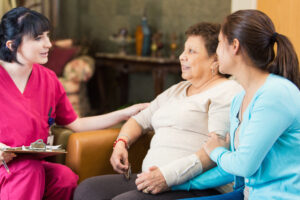
The Alzheimer Society is here to support you throughout your dementia journey – which often begins before an official diagnosis is made.
Recognizing the difference between signs of dementia and normal signs of aging can help you to figure out if a visit to the doctor is necessary. But how can you tell the difference between mild memory loss associated with normal aging and memory loss associated with dementia?
Aging is a natural process that all of us experience differently. Gradual changes to our brains and bodies occur as we age, including memory loss. Below are some of the main differences to look for:
Age-Associated Memory Impairment
Age-associated memory loss is a normal part of aging and doesn’t mean you have dementia.
If you are experiencing difficulties with memory and:
- They are not noticeably disrupting your daily life
- They are not affecting your ability to complete tasks as you usually would
- You have no difficulty learning and remembering new things
- There’s no underlying medical condition causing your memory problems
Then you likely have what’s called age-associated memory impairment, a normal part of aging.
Dementia Memory Loss
When your memory loss is severe to the point where:
- It’s affecting your daily life and ability to stick to your normal routine
- You’re finding it difficult to learn new things
- You’re finding it difficult to complete tasks you’re familiar with, and
- Others close to you are also starting to notice changes in your abilities
Then the memory loss may be associated with early signs and symptoms of dementia. Knowing the warning signs of dementia can further help you to determine when the occasional memory lapse may be something more serious.
The 10 warning signs of dementia are:
- Memory loss that affects day-to-day abilities
- Difficulty performing familiar tasks
- Problems with language
- Disorientation in time and place
- Impaired judgement
- Problems with abstract thinking
- Misplacing things
- Changes in mood and behaviour
- Changes in personality
- Loss of initiative
It’s important to discuss these signs with your healthcare professional. If you are concerned about yourself or someone you know, the Alzheimer Society’s First Link® Client Support team can help guide you through the process of getting a diagnosis. There are also resources on our website to help you prepare for a visit with your doctor or healthcare provider, like the Getting a Diagnosis Toolkit.
The earlier a diagnosis is made, the earlier the Alzheimer Society can connect you to information, education, support services and other community resources to help support you along your dementia journey.
Visit the We Can Help page to learn more about our programs and services or reach out to us at 204-943-6622 (Wpg) or 1-800-378-6699 (MB) and ask to speak to a Client Support Coordinator or Regional Coordinator.
Types of Dementia Series: Which Dementias Are Most Common?
Dementia is an umbrella term used to describe a range of neurological conditions affecting the brain that get worse over time. The term refers to a loss of cognitive functioning – in thinking, remembering and reasoning – to the degree that it interferes with a person’s daily life and everyday activities. In this series, we take a look at several different forms of dementia, with this installment covering the four most common types of dementia.

The most common types of dementia are:
All dementias can have similar and overlapping symptoms. Check out the descriptions below to learn the differences between these four types.
Alzheimer’s disease is a progressive, degenerative brain disease and the most common type of dementia, accounting for 64% of all diagnoses. It causes changes in the brain, affecting how someone thinks, feels and acts.
Alzheimer’s disease causes symptoms of dementia such as memory loss, difficulty performing daily activities and changes in judgement, reasoning, behaviour, and emotions. These dementia symptoms are irreversible, which means that any loss of abilities cannot come back.
Each person is affected differently by Alzheimer’s disease. It is difficult to predict which symptoms will happen, the order in which they will appear, or the speed of their progression. The following are some of the changes that may happen as the disease progresses:
- Cognitive and functional abilities (changing ability to understand, think, remember and communicate)
- Emotions and moods (showing less expression, being withdrawn, losing interest in favourite hobbies)
- Behaviour (repeating words or actions, responsive behaviours, restlessness)
- Physical abilities (experiencing changes with coordination and mobility)
Vascular dementia is the second most common type of dementia. It is caused when the brain’s blood supply is blocked or damaged, causing brain cells to die from lack of oxygen. The blockage or damage to the brain’s blood supply can result from one or multiple strokes. The onset often happens suddenly after a stroke.
The symptoms may vary, affecting some areas of the brain more or less than others (such as language, vision or memory).
The symptoms of vascular dementia may include:
- Changes in the ability to make decisions, plan or organize
- Difficulties with movement, such as slow gait and poor balance
Symptoms tend to appear slowly. Specific impairments may occur in steps, where abilities deteriorate, stabilize for a period of time and then deteriorate again.
Having a stroke more than doubles your risk of developing dementia. Recognizing the signs of a stroke and acting quickly can make a difference in recovery and in lowering the risk of dementia. A stroke can:
- Affect your ability to walk
- Cause weakness in your arms or legs
- Cause you to slur your speech
- Cause changes in your behaviour, such as having emotional outbursts
- Impact your cognitive abilities such as memory and abstract thinking, holding conversation and processing visual information
Lewy Body dementia also sometimes known as dementia with Lewy bodies—is a form of dementia characterized by abnormal deposits of a protein called alpha-synuclein, or more simply called “Lewy bodies,” that form inside the brain’s nerve cells. This type of dementia usually progresses rapidly and accounts for 5-15% of all dementia cases.
Lewy body dementia may cause symptoms that are similar to both Alzheimer’s disease and Parkinson’s disease. In this form of dementia, there is progressive loss of memory, language, reasoning and other higher mental functions, such as calculation.
A person living with Lewy body dementia will experience a decline in thinking and memory over time. It can also affect how quickly the brain can process information. Lewy body dementia also affects visual-spatial perception—how accurately we can perceive objects in relation to each other. For example, visual-spatial perception helps a person place a pencil on a table without consciously concentrating on that action.
Other symptoms may include:
- Changes in attention and alertness; a state of confusion that comes and goes
- Recurring visual hallucinations which can worsen during times of increased confusion
- Impacts on motor functioning, such as moving and controlling muscles
- Disruptions during sleep, such as acting out dreams
Frontotemporal dementia is caused by damage occurring in the frontal lobe (near the forehead) and/or the temporal parts (near the ears) of the brain. These are the areas in the brain responsible for personality, behaviour, emotions, language, speech, abstract thinking and movement. Researchers estimate that approximately 5-10% of all dementia cases are frontotemporal dementia.
Frontotemporal dementia can cause behaviour changes, difficulties with speech and movement, or memory loss. In early signs of frontotemporal dementia, behaviour changes or problems with speech can appear separately. Memory loss is often not present early on in this type of dementia.
However, these symptoms will increasingly overlap. As this type of dementia progresses, the damage to the brain is usually more generalized, and symptoms usually appear to be similar to Alzheimer’s.
Some of the symptoms people living with frontotemporal dementia may experience are:
- Withdrawn or losing the ability to restrain actions
- Loss of interest in personal hygiene
- Tendency to become easily distracted or to repeat the same activities continuously
- Overeating, or an unusual desire to put foreign objects in the mouth
- Incontinence, or inability to wait to go to the toilet
Click here to learn more about these and other types of dementia. For more information, contact the Alzheimer Society of Manitoba at 204-943-6622 (Wpg) or 1-800-378-6699 (MB) and ask to speak to a Client Support Coordinator or Regional Coordinator.
The Latest in Dementia Treatment Research – Lecanemab
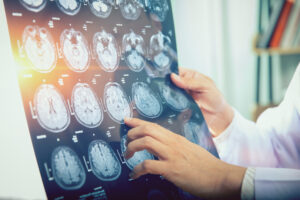
Currently, there are more than 200 dementia drugs in development internationally, and research continues worldwide toward finding treatments for dementia, which offers hope to thousands, if not millions, of people.
The newest treatment going through a trial is a drug called lecanemab, produced by the drug companies Eisai and Biogen. Lecanemab is an exciting step forward for dementia research, but there are side effects to this drug, and more research is needed to see if this will be a safe and effective treatment option for people living with dementia.
On November 29, 2022, the companies released full results from the lecanemab Phase Three clinical trial at the Clinical Trials on Alzheimer’s Disease conference held in San Francisco. A Phase Three trial is performed just before a drug is submitted to government health authorities for approval. This lecanemab trial had 1,795 participants – including some from Canada.
The trial results showed that:
- Lecanemab slowed cognitive decline by 27% compared to a placebo over 18 months
- However, the drug was associated with negative side effects, including brain swelling in 12.6% of trial participants (compared to 9% for placebo)
- Side effects also included brain bleeds in 17.3% of trial participants (compared to 1.7% for placebo)
- Eisai said lecanemab seemed less effective in trial participants who have a higher genetic risk for Alzheimer’s or another dementia
- Longer trials are needed to determine the efficacy and safety of lecanemab in early Alzheimer’s and dementia.
More data released in Science reveals the deaths of three people who were involved in the lecanemab trials. A full investigation of this data is important, as is a full investigation of the rest of the trial data. It’s essential that any drugs approved for dementia treatment are safe and effective.
There is no news yet about any attempts by Eisai and Biogen to submit the drug lecanemab for Health Canada approval. We trust and support Health Canada’s rigorous safety and effectiveness assessments of any and all dementia-aimed drugs past, present and future.
At least four other major clinical trials involving this drug are ongoing internationally, with those trials due to be completed between 2025 and 2027. The Alzheimer Society will continue to monitor the latest research and developments in this case and others related to dementia.
2023 Winter Education Calendar is Now Available!

The 2023 Winter Education Calendar is now available! Our winter sessions are offered both in-person and via Zoom and cover a variety of topics to help you on your dementia journey.
Click the links below to check out available seminars and to register!
Family Education Winter 2023 Calendar
Family Education – Alzheimer Society of Manitoba
Register Today for the Winter 2023 Community Programs!

We have partnered with various organizations for people with dementia and their care partners to participate in activities with others living in similar situations. These opportunities offer social, creative and educational ways to get out in the community and enjoy life.
You can now register for the following Winter 2023 dementia-friendly community programs!
Tales Along The Trail
Enjoy Manitoba’s winter outdoors! Warm mittens, crunchy snow, and crackling campfires set up calming, fun, natural adventure – all within city limits!
Tales Along the Trail is for people living with early to moderate symptoms of dementia and their care partners who are looking for a safe but exciting way to encounter the natural world.
An experienced naturalist will guide the group along FortWhyte’s gentle pathways, pointing out all winter has to offer and encouraging everyone to use all their senses to explore.
Each session will have a relaxing walk through the woods, with stops focusing on all of our senses. We then will have a chance to share thoughts, stories, and a snack around a crackling fire or cozy indoor space. In stormy weather, we bring nature indoors, keeping the engagement and fun going while we watch the wind and snow outside.
Winter Program (Wednesdays)
January 25 – March 8
$126/pair for all seven sessions
Registration open now. Please contact [email protected] for a link to register for this program.

Vivace Voices Choir
Come and join in making music together! Singing in a choir is a challenging and joyful experience. Learn to sing new and familiar music while making connections with those around you. No prior choral experience is required. Care partners must attend with persons living with dementia.
Winter Program (10 weeks)
Wednesdays, 6:30 – 7:30 pm, $145/pair
January 25 – April 19
Click here to learn more and to register!
Developed by the Community School of Music and the Arts at Canadian Mennonite University with assistance from the Alzheimer Society of Manitoba.
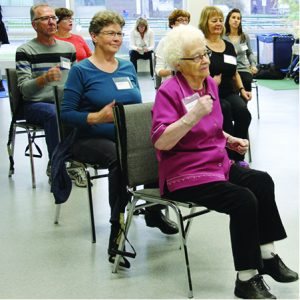 Minds in Motion®
Minds in Motion®
Our popular Minds in Motion® program connects people living with early to moderate signs of dementia and their care partners through fitness, fun and friendship. Participants take part in a gentle chair fitness class followed by socially engaging activities and conversation.
There are lots of laughs and social interactions during these sessions. We are excited to offer both in-person and online options.
Dates, times and registration information are available for the Winter 2023 Minds in Motion sessions! Click here to learn more and to register.
Dementia Care Series – Register Today!
Essentials of Day-to-day Dementia Care – Sponsored by All Seniors Care
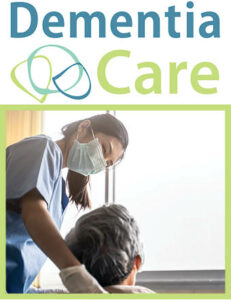
We invite you to our Dementia Care Professional Development Series! Sessions are geared towards health care staff and take place online monthly until March 2023.
Join our next session on Thursday, January 19, from 2 – 3 pm called Digging Deeper into Advance Care Planning featuring Andrew Saunderson and Laura Gaspard, Advance Care Planning Social Workers from Fraser Health, who will provide insight on advance care planning using real-life case scenarios and a review of the important steps in the planning process.
This professional development series, which started in April, focuses on the foundation for successful and meaningful dementia care that will benefit the person living with dementia, their families and the healthcare system as a whole. For a $20 registration fee, you can watch all 3 remaining live presentations and get access to recordings of all 11 sessions!
Visit our website today for upcoming sessions, speaker bios and to register today!
Join a Support Group!
 We welcome you to join one of our many virtual or in-person support group offerings this winter.
We welcome you to join one of our many virtual or in-person support group offerings this winter.
Support groups provide participants with an opportunity to learn more about dementia and its progression, share feelings and common experiences, exchange practical coping strategies and mutual support, as well as participate in meaningful discussions.
These support groups are a confidential and safe place for care partners to share their experiences of caring for a person living with dementia or memory loss. We welcome everyone to this inclusive environment for people of different ethnicities, cultures or persons who identify as part of the 2SLGBTQ+ community.
Care Partner Support Groups
We’ve highlighted a few of our Care Partner Support Group offerings below, but for a complete listing of all virtual and in-person support groups, please visit our Support Groups page.
Men’s Coffee Talk Support Group
Meets in person at the provincial office in Winnipeg on the fourth Thursday of the month from 10:00 to 11:30 am.
This support group is for male-identifying care partners to connect with one another and share information about their experience of caring for a person with Alzheimer’s or another dementia.
Spouses of People Living with Dementia in Personal Care Home
Meets in person at the provincial office in Winnipeg on the second Wednesday of the month from 2:00 to 3:30 pm.
This support group offers spouses of people with dementia living in a personal care home the opportunity to meet and share information about their experience of caring for someone who has transitioned into a personal care home. This caregiving experience presents unique challenges for care partners as they:
- Navigate their changing roles
- Adjust to changes in self-identity
- Adjust to living separately from their spouse
- Help to support a spouse in their dementia journey
Virtual Ambiguous Loss Support Group
The Ambiguous Loss Support Group assists care partners to work through the feelings of ambiguous loss and grief that are experienced when someone close to you has dementia. The goal is to help care partners build up enhanced coping strategies that will support you in your role as a caregiver, and to help you plan for the future.
For more information, or to add your name to the waitlist for the next available session, please contact:
Samantha Holland
Interlake-Eastern Regional Coordinator
204-268-4752
[email protected]
Support Groups for Persons with Dementia
Having a diagnosis of dementia can lead to a variety of thoughts, feelings, and emotions. Our support groups for people with dementia provide participants with an opportunity to:
- Learn about dementia and its progression
- Share feelings and common experiences
- Exchange practical coping strategies and mutual support
- Participate in meaningful discussions
For more information about current and upcoming support group opportunities, both virtually and in-person, please contact:
Sarah Dueck
Client Support Coordinator & Group Lead, Winnipeg/Provincial Office
204-943-6622 ext. 213
[email protected]
Additional Information
For more information about all support group offerings, including registration information, please contact the First Link Client Support team at 204-943-6622 or email us at [email protected].
Our new support groups were made possible by a multi-year commitment for our First Link® program from the Jessiman Foundation. A heartfelt thanks to the Jessiman family for this leadership gift that has allowed us to expand our programs in such a significant way.
We Rely on Your Donations to Continue Our Work

Your gifts are put to immediate use through our helpline, support groups and education programs.
Remember. You Are Not Alone.
We are here to help you and your family no matter where you are in your dementia journey. You can reach a comforting ear by phone or get a quick response by email. Call us at 204-943-6622 (Wpg), 1-800-378-6699 (MB) or email [email protected]
